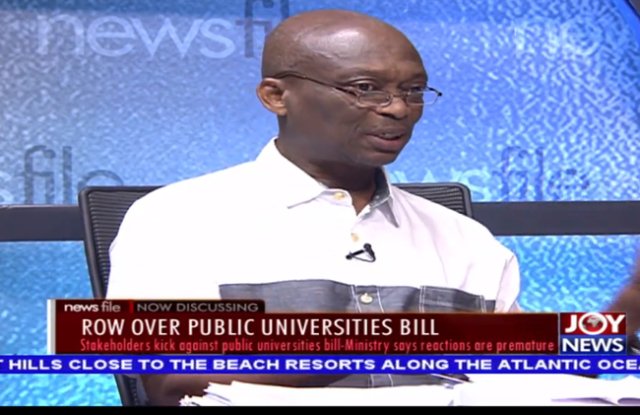
The editor-in-chief of the New Crusading Guide
Newspaper is baffled by some comments that have characterised the draft Public
University Bill.
Describing them as premature, Mr Kweku Baako believes the comments are needless, especially when the Bill is still at its preliminary stage and liable to change.
Speaking on MultiTv/FM’s news analysis programme Newsfile, Saturday, the veteran journalist said the government cannot impose any directives on the universities, if that was possible, their suggestions would not have been solicited.
“At this stage, my understanding is that this particular bill has been communicated or delivered to the immediate stakeholders – Vice-Chancellors, UTAG and other related unions – for their input so that those who sent it, together with them, can put up a draft that will go to Cabinet before Parliament.
“That is the stage at which we are – pre-legislation stage. I have absolutely nothing against the criticism but I think at this stage, the most important thing the policymakers are looking for is the input of the immediate stakeholders and at the end, you expect that the processes they are going through will lead to a redefined draft Bill. So there is no cause for alarm, it is ‘premature ejaculation’,” he said.
Among other things, the draft Bill gives the
president the authority to appoint five out of the nine members that will
make up the Governing Council of universities. This includes the Chairman.
The president also has the power, per the Bill, to dissolve the Council during an emergency and Unions are to appoint only one representative on a rotational basis to serve on it at each cycle.
This has left many
stakeholders unhappy. A Political Science lecturer at the University of Ghana,
Ransford Gyampo sees that move as one that will stifle academic freedom.
“Per the draft bill I have read, the government is seeking to reduce the composition of public university councils from the average of 15 to nine.
“With this number, the government wants to appoint more people than other
constituents. This is the first step at mortgaging the independence and freedom
of academic institutions,” Prof. Gyampo contended.
The University of Health and Allied Sciences has completely rejected the Bill it describes as unclear.
Its Vice-Chancellor, in a letter to government, said, “the basic premise of a harmonised
Public Universities Act is wrong as it seeks to make all public universities
‘look same’.”
Some members of the Minority are also unhappy with the Bill. North Tongu MP who served as Deputy Education Minister under the Mahama-led administration said the provisions of the draft Bill portrayed “a desperate authoritarian agenda to assail the pillars of insulation and thereby blatantly interfere with the management of our higher institutions of learning, in flagrant violation of Article 21 of the 1992 Constitution of Ghana”.
He contended that the proposal would successfully place the
university councils and, by logical extension, the entire university, under
political control.
But
Mr Baako said the intention of the Bill as it stands, currently cannot be final.
If
anything at all, he believes that the public discourse on the issue has brought
to the fore some specifics that can be reviewed before an absolute decision is
taken.
For
him, unless the proposed draft Bill will take away diversity in the public
universities, what he describes as “the manufacture of conspiracy theories and
suspicions,” are out of place.
He
is certain that government will take the stakeholder engagements seriously but
added that there is an element of overkill in terms of the reaction and
verdicts so far on the specifics of the Bill.
Source: myjoyonline.com

